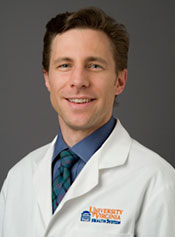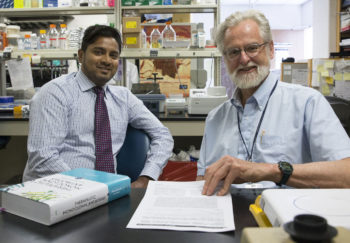This month, researchers announced a new diagnostic test that can help physicians predict teenagers’ future risk of developing heart disease. Researchers also looked at the effects of weight-loss surgery, the heart’s reliance on blood sugar, how the Affordable Care Act benefited low-income HIV patients in Virginia and the number of women who still aren’t receiving radiation treatment for breast cancer.
New Test Can Predict a Teen’s Future Risk for Heart Disease
The One-Gulp Synopsis:
Researchers have created a new test that allows doctors to assess teens’ risk for developing heart disease later in life.
The Bigger Bite:
This new diagnostic test developed by Mark DeBoer, MD, of the UVA Department of Pediatrics, and colleagues could be more useful than other tests because it allows physicians to rate patients’ risk on a scale by giving them a specific score.
“We are hopeful that this score can be used to assess the baseline risk for adolescents regarding metabolic syndrome and their risk for future disease and use it as a motivator for individuals to try to change their risk so that they may have a healthier diet, engage in more physical activity or get medication to reduce their metabolic syndrome severity and their future risk for disease,” DeBoer said.
Doctors can use the test to identify patients at a young age that have a high risk of developing heart disease and then recommend healthy behaviors that can help save their lives.
Learn more about the new heart disease test for teens.
Benefits of Weight-Loss Surgery
The One-Gulp Synopsis:
Multiple health benefits in obese women who have weight-loss surgery, including the possibility of preventing cancer.
The Bigger Bite:
Weight-loss surgery for obese women:
- slashed participants’ weight by a third
- produced a mean weight loss of more than 100 pounds
- eliminated precancerous uterine growths
- improved insulin levels and glucose use
- altered the composition of gut bacteria
- improved physical quality of life
“If you look at cancers in women, about a fifth of all cancer deaths would be prevented if we had women at normal body weight in the U.S.,” said Susan C. Modesitt, MD, of UVA Cancer Center. “When you’re looking at obesity-related cancers, the biggest one is endometrial cancer, but also colon cancer, breast cancer, renal cancer and gall bladder cancer. We think about 40 (percent) to 50 percent of all endometrial cancer, which is in the lining of the uterus, is caused by obesity.”
Read more about this research on the benefits of weight-loss surgery.
Can Blood Sugar Cause Heart Failure?
The One-Gulp Synopsis:
Researchers at the School of Medicine are trying to prevent heart failure by examining the dangerous effects of having high blood sugar (glucose) levels.
The Bigger Bite:
Want More Research News?
For new discoveries and clinics, check out the Health System’s online newsroom.
Bijoy Kundu, PhD, is leading a team of researchers who are using cutting-edge technology to analyze metabolic changes as they happen in the heart. The key is to determine when the heart’s reliance on sugar goes from good to bad. Blood sugar is good for the heart but too much can cause the heart to enlarge and affects the heart’s ability to function properly.
The team is hoping their work can help determine the cause of cardiac hypertrophy (heart thickening) that can lead to heart failure, how it can be avoided and provide a drug that could prevent it from happening.
Read more about their work to prevent heart failure.
Many Breast Cancer Patients Not Getting Life-Saving Treatment
The One Gulp Synopsis:
Many patients still aren’t receiving a faster, safer radiation treatment that could potentially save their lives.
The Bigger Bite:
Nengliang (Aaron) Yao, PhD, of the School of Medicine’s Department of Public Health Sciences and Abram Recht, MD, of Harvard Medical School conducted a study that shows women in the U.S. still aren’t getting radiation treatment after breast cancer surgery. Their findings show that about 14 percent of early-stage breast cancer patients did not receive radiation treatments despite the availability of a streamlined approach that dramatically reduces the number of doctor visits needed.
“The problem is that [traditional] radiation therapy is a long-course treatment. Normally you see your radiation oncologist every day for five to seven weeks. Each treatment is only a few minutes, but it’s not convenient at all for a lot of patients,” explained Yao. “This new therapy is actually improving convenience and reducing toxicity, and has become more accessible over time, but you don’t see an improvement in adherence to radiation therapy after lumpectomy.”
It was hoped that the new accelerated treatment option would reduce the number of women who did not receive radiation. However, the number hasn’t been lowered much at all. The study did not look at the reasons that more aren’t getting the treatment, but Yao hopes to continue to investigate the issue in future research.
Read more about the breast cancer treatment research.
Low Income HIV Patients Benefit From Affordable Care Act
The One-Gulp Synopsis:
Low-income Virginians with HIV had better health outcomes when enrolled in Affordable Care Act health insurance plans.
The Bigger Bite:
A team of researchers led by Kathleen McManus, MD, of the School of Medicine’s Division of Infectious Diseases and International Health have determined that low-income Virginians with HIV had better outcomes when enrolled in Affordable Care Act healthcare plans. They looked at the rates of virologic suppression, the most critical outcome in HIV care, among those enrolled in Affordable Care Act plans and those who received care under the state’s AIDS Drug Assistance Program (ADAP). More than 85 percent (85.5 percent) of patients with Affordable Care Act (ACA) insurance were found to be in a state of virologic suppression, compared with 78.7 percent of those in ADAP.
The study also found:
- patients ages 25 to 34 and 35 to 44 were less likely to enroll in Affordable Care Act plans than those younger or older;
- blacks were less likely to enroll than whites;
- people with AIDS were less likely to enroll than those with HIV;
- women were more likely to enroll;
- patient groups specifically targeted for enrollment, such as people whose insurance was ending, were more likely to enroll.
Learn more about this study on the Affordable Care Act.

